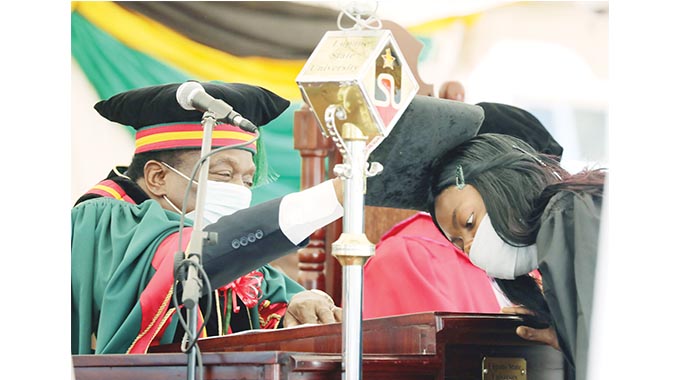1 085 graduate at Lupane

Nqobile Tshili, Chronicle Reporter
A TOTAL of 1 085 students yesterday graduated at the Lupane State University (LSU)’s 11th graduation ceremony since the opening of the university in 2005.
Only a fraction of the 1 085 graduates who received accolades for excelling in their studies attended yesterday’s graduation ceremony which was held at the university’s main campus in Lupane, Matabeleleland North.
The rest of the graduates followed proceedings online.
This was done as part of the Covid-19 mitigation measures to minimise gatherings.
From the total number of graduates, 58 percent were females.
Among the graduates, 449 were conferred with post-graduate degrees and the university recorded its first PHD graduate while 474 received undergraduate degrees and 152 graduated with diploma certificates.
President Mnangagwa, who is also Chancellor of all State universities conferred degrees and diplomas to the limited graduates.
Delivering his keynote address, LSU Vice Chancellor Professor Pardon Kuipa said the graduation was being held under extraordinary circumstances due to the Covid-19 pandemic.
He said the higher and tertiary education sector had to quickly adapt and adopt to the new normal when Covid-19 disrupted normal learning.
“The 2020 second semester was something we never imagined. Our plans and normal routines were disrupted but we rose to the challenge and completed the semester against all odds. Our students and staff exhibited considerable flexibility during the peak period of Covid-19 pandemic by adapting quickly to a new mode of teaching and learning,” he said.
“In response to the challenges posed by the Covid-19 pandemic in delivering face-to-face tuition to students, the university trained its lecturers on online teaching methods through a workshop which was conducted virtually from the 25th of May 2020 to the 17th of July 2020 by the Association of African Universities (AAU) in collaboration with E-Learning Africa.”
The Covid-19 pandemic forced Government to close schools, colleges and universities as part of measures to curb the spread of the pandemic.
When the infection risk was perceived to be lower, the universities reopened thereby enabling students to complete their semesters.
Prof Kuipa commended President Mnangagwa’s leadership, saying it is only through his guidance that the country has been named the safest place to visit post-Covid-19 pandemic.
“As a direct result of your visionary leadership Zimbabwe also registered a significant improvement in the World Bank Ease of doing Business Report for 2020 which placed the country among the top 20 reformers in the world and among the top five reformers in Africa,” he said.
Prof Kuipa said the country needs to leverage on high skilled human resources in exploiting natural resources that the country has to compete at a global level.
“In order to take advantage of the developments in technology and contribute to innovation, higher level research knowledge is critical. In order to build research and innovation ecosystems, promote and preserve culture and strengthen collaborative cultures, higher education needs to yield diverse and complex capabilities, including the production of goods and services as envisioned by Education 5.0,” said Prof Kuipa.
He said the university has embraced the paradigm shift in the higher and tertiary education sector by engaging in partnerships to address societal economic challenges.
Thus, for example, the National Railways of Zimbabwe (NRZ) and LSU have signed a Memorandum of Understanding (MoU) on collaboration for the establishment of an industry related innovation hub. The NRZ has also agreed to allow engineering students at the university to use its laboratories and workshops for their practical lessons,” he said.
Prof Kuipa said the training the students received during the course of their studies has equipped them to handle societal challenges.
Higher and Tertiary Education, Innovation, Science and Technology Development Minister Professor Amon Murwira, Primary and Secondary Education Minister Cain Mathema, Matabeleland North Provincial Affairs and Devolution Minister Richard Moyo, Women Affairs, Community, Small and Medium Enterprise Development Minister Dr Sithembiso Nyoni and State Security Minister Owen Ncube were among the guests who attended the graduation ceremony.
A handful of families and friends of graduates who received awards also attended the graduation ceremony. — @nqotshili










Comments